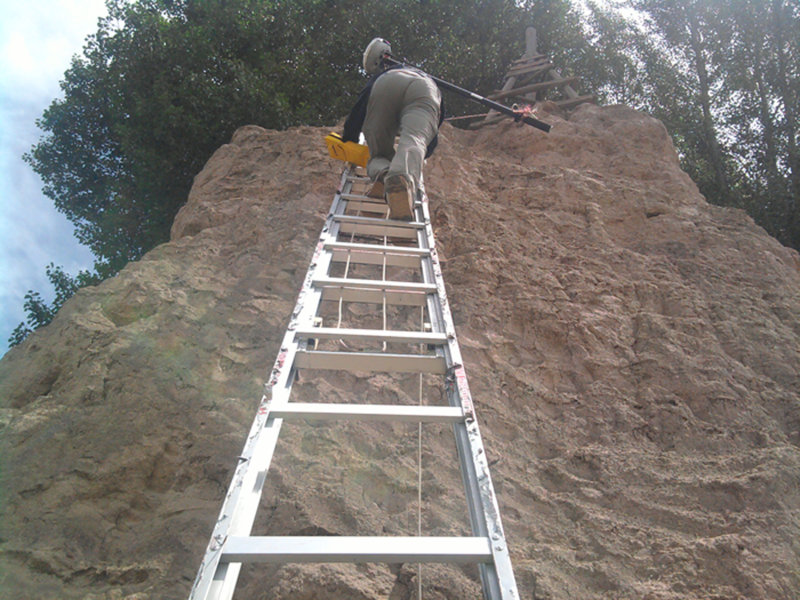HiWATER: Dataset of differential GPS in the middle and upper reaches of the Heihe River Basin (2012)

The purpose of differential GPS positioning survey is to unify multiple survey areas into the same coordinate system and realize accurate absolute positioning through joint survey with national high-level control point coordinates. Under the national geodetic coordinate system of 2000, the accurate positioning of flux observation matrix, hulugou small watershed, tianmuchi small watershed and dayokou watershed and target is completed. In order to realize the geometric correction and absolute positioning of optical image, SAR image and airborne lidar data, the layout of ground control points and high-precision measurement are completed. In the middle reaches of the area, one national high-level control point is jointly surveyed in the five directions of East, South, West, North and middle. Measuring instrument:
There are 3 sets of triple R8 GNSS system.
Measurement principle:
For the control network encryption point, it is connected with the high-level known points in four quadrants around the survey area and distributed evenly in the survey area. For the ground control point (GCP), the obvious characteristic points (such as house corner, road intersection, inflection point, etc.) of the ground layout target and the independent ground objects are adopted and evenly distributed in the survey area. For the ground points with high accuracy requirements, the principle of average value of multiple (at least three) measurements is adopted.
Measurement method:
In the test area, the control network is encrypted, and GPS static measurement and national high-level control network are used for joint measurement and calculation. During measurement, multiple GPS receivers conduct static synchronous observation at different stations, and the observation time is strictly in accordance with the control network measurement specifications.
The ground points in the test area are accurately located. GPS-RTK positioning technology is used and the national high-level control points are used to calibrate to the local coordinate system. When the mobile station obtains the fixed solution during the coordinate acquisition, the measurement is carried out again and the single measurement lasts for 5S.
Measuring position:
(1) Flux observation matrix
17 stations, Las tower, waternet, soilnet and bnunet nodes in the core area of flux observation matrix; ground control points in CASI flight area; ground corner reflector positions in radar coverage area; ground target positions in lidar flight area.
(2) Hulugou small watershed
Ground target location of lidar flight area.
(3) Tianmuchi small watershed
Ground target location of lidar flight area.
(4) Dayokou Basin
Satellite image geometric correction ground control point.
Data format:
GPS static survey, the original data format is ". Dat" and ". T01" (or ". T02") files (or converted renix data) and "field record". GPS-RTK survey, the original project is ". Job" file (or converted ". DC" file).
The test results are submitted in the format of exported ". CSV" data, which can be viewed and edited by Excel software.
Measurement time:
June 19, 2012 to July 30, 2012
Data Citations
Related Literatures:1. Che, T., Li, X., Liu, S., Li, H., Xu, Z., Tan, J., Zhang, Y., Ren, Z., Xiao, L., Deng, J., Jin, R., Ma, M., Wang, J., & Yang, X. (2019). Integrated hydrometeorological, snow and frozen-ground observations in the alpine region of the Heihe River Basin, China. Earth System Science Data, 11, 1483-1499(View Details |Download )
2. Li, X., Liu, S.M., Xiao, Q., Ma, M.G., Jin, R., Che, T., Wang, W.Z., Hu, X.L., Xu, Z.W., Wen, J.G., Wang, L.X. (2017). A multiscale dataset for understanding complex eco-hydrological processes in a heterogeneous oasis system. Scientific Data, 4, 170083. doi:10.1038/sdata.2017.83.(View Details |Download )
Cite as:Liu, X., Ma, M. (2017). < b>HiWATER: Dataset of differential GPS in the middle and upper reaches of the Heihe River Basin (2012)</b>2017. doi: 10.3972/hiwater.039.2013.db. (Download the reference: RIS | Bibtex )
Using this data, the data citation is required to be referenced and the related literatures are suggested to be cited.
References literature
1.Li Xin, Liu Shaomin, Ma Mingguo, Xiao Qing, Liu Qinhuo, Jin Rui, Che Tao. HiWATER: An Integrated Remote Sensing Experiment on Hydrological and Ecological Processes in the Heihe River Basin. Advances in Earth Science, 2012, 27(5): 481-498. (View Details |Download)
2.Li X, Cheng GD, Liu SM, Xiao Q, Ma MG, Jin R, Che T, Liu QH, Wang WZ, Qi Y, Wen JG, Li HY, Zhu GF, Guo JW, Ran YH, Wang SG, Zhu ZL, Zhou J, Hu XL, Xu ZW. Heihe Watershed Allied Telemetry Experimental Research (HiWATER): Scientific objectives and experimental design. Bulletin of the American Meteorological Society, 2013, 94(8): 1145-1160, 10.1175/BAMS-D-12-00154.1. (View Details )
Terms of Use
To respect the intellectual property rights, protect the rights of data authors, expand services of the data center, and evaluate the application potential of data, data users should clearly indicate the source of the data and the author of the data in the research results generated by using the data (including published papers, articles, data products, and unpublished research reports, data products and other results). For re-posting (second or multiple releases) data, the author must also indicate the source of the original data.
Support Program
Heihe Watershed Allied Telemetry Experimental Research (HiWATER)
Related Resources
1.The leaf water potential dataset in the downstream of the Heihe River Basin (2012)
2.HiWATER: the albedo in the middle reaches of the Heihe River Basin (Jun. 29, 2012)
3.Grassland interception dataset of Tianlaochi watershed in Qilian Mountain
4.HiWATER: Dataset of infrared temperature in Zhanye Airport desert
No record
No record
Comments
Sign In to add comments
Keywords
- Discipline: 陆地表层
- Theme: 陆地表层遥感 地面验证信息
- Places:
- Time: 2012 2012-06-19 to 2012-07-30
Geographic coverage
| Spatial coverage |
East:100.58 South:38.15 |
West:99.12 North:38.97 |
|---|
Details
- Format: 文本, *.dat后缀
- File size: 10.0 MB
- Browse count:10413
- Temporal coverage:2012-07-04 To 2012-08-14
- Access: Offline
- Updated time:2021-04-19
Authors
Resource Provider: LIU Xiangfeng MA Mingguo

 Copyright ©right; 2017 - 中国科学院西北生态环境资源研究院 - 兰州数云软件科技有限公司提供技术支持
Copyright ©right; 2017 - 中国科学院西北生态环境资源研究院 - 兰州数云软件科技有限公司提供技术支持